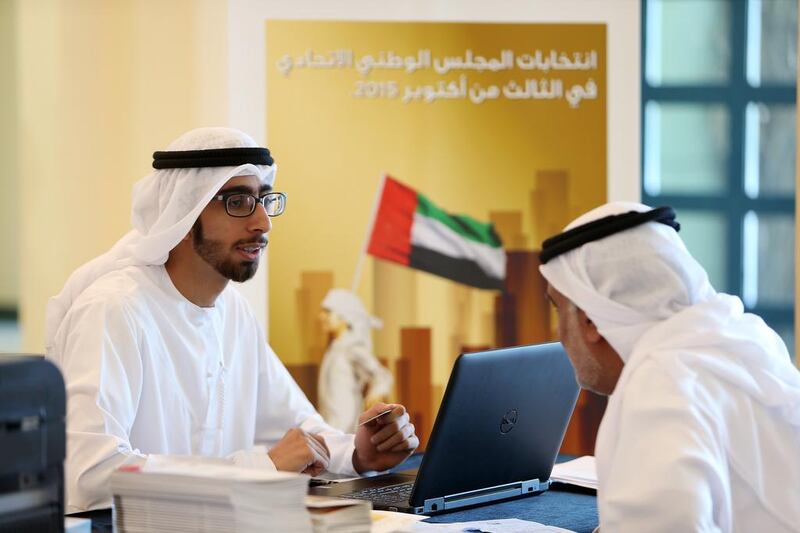This has been a big week for the UAE. Registration for candidates wishing to run for Federal National Council (FNC) seats started on Sunday and will close tomorrow. Many Emiratis have already visited registration centres to file for candidacy.
These potential candidates have different motives for standing. Some see it as a national duty – including 40-year-old Ali Al Soudeen, who told The National that his motive was to give back to the UAE by serving on the FNC. Others consider it a social responsibility – including Maitha Al Rumaithi, who said she hopes to serve society by focusing on the family unit.
While these are good motives, there are also those who may see the FNC as a way to promote themselves within society. There are those who look for the prestige that comes with being an FNC member, without having a clear road map about what they want to accomplish should they be elected.
Being a member of the FNC comes with a huge responsibility. It’s true that it is an advisory body, not a legislative one. And while this might make it less powerful than other arms of government, it still places an obligation on members to help the FNC evolve in a positive direction.
It’s important to keep in mind that the FNC is a work in progress. Members – elected or appointed – have to believe in the body’s potential more than anyone in this society.
To be a member, one should not just fulfil the basic criteria set by the Ministry of State for Federal National Council, which relate to residency, age, good conduct, basic Arabic literacy and employment. Members have to be well-educated, well-informed, have basic critical-thinking skills and be full of relevant ideas. They need to understand the needs and concerns of people at all levels of society, not only those in their social circle.
The role of FNC members goes well beyond attending public sessions. It extends to committee work that looks at issues and laws in greater depth than is possible in the meeting chamber. There is a full timetable of work and a large group of people are involved in the process.
FNC members have a duty to spend time reaching out to people in their constituency and listen to what they have to say. Candidates must aim to make a difference in both the council itself and the community at large.
For their part, voters have the obligation to cast their ballot for the most qualified person, not for the one who is closest to them. They must look beyond their relatives and people they already know.
In any election it is easier to choose someone familiar than to make the effort to look for someone more qualified and capable. We have to strive towards a meritocracy.
However, there are still some questions regarding the mechanism of the election. The current system provides for a limited list of eligible voters. I’ve done a quick survey of people around me and on social media and found that there is some disappointment among those who do not have the right to vote in the election.
One active member of the community expressed a lack of enthusiasm about the elections after finding out – for the second time in a row – that her name isn’t on the list. In 2011, she was positive about the situation and even volunteered to take part in organising the elections. This year, she finds it harder to hide her disappointment.
There is also a problem with turnout among those who are eligible to vote. In the 2011 elections, only 28 per cent of the 135,308 eligible voters cast a ballot. This year, the number of Emiratis eligible to vote and stand as candidates has increased to almost 225,000, and more people seem to be aware of the FNC and the job it does. Hopefully, this will increase the turnout on election day, October 3.
Dr Anwar Gargash, the Minister of State for Federal National Council Affairs, stressed during his recent talk with a group of military officers and policemen that the gradual development of the council had been carefully planned to achieve "a politically empowering and unifying experience" and to avoid the shortfalls of the political process in other regional countries.
While we may not all agree exactly what the next step should be, all of us would agree that having a unified vision is critical. Visionary thinking is what has made this country a beacon for stability and economic prosperity in a war-torn region.
aalmazrouei@thenational.ae
On Twitter: @AyeshaAlmazroui





